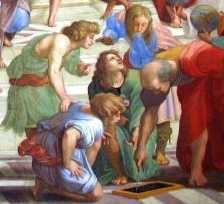O Truth, O Charity, O Final Goal and Happiness!
Ætérna lux, divínitas,
Eternal light, divinity,
in unitáte Trínitas,
in the unity of Trinity,
te confitémur débiles,
feeble though we be, we confess Thee
te deprecámur súpplices.
Thee we entreat on bended knee.
Eternal Light, Divinity,
O Unity in Trinity,
Thy holy name Thy servants bless,
to Thee we pray, and Thee confess.
2. Summum Paréntem crédimus
We trust in the greatest Father
Natúmque Patris únicum,
and the only Son of the Father,
et caritátis vínculum
and in the bond of charity
qui iungit illos Spíritum.
which joins them with the Spirit.
2.We praise the Father, mighty One;
we praise the sole-begotten Son;
we praise the Holy Ghost above,
who joins Them in one bond of love.
3. O véritas, o cáritas,
O Truth, O Charity,
o finis et felícitas,
O final goal and happiness,
speráre fac et crédere,
cause us to hope and to beleive,
amáre fac et cónsequi.
cause us to love and to follow.
3. O Verity! O Charity!
O Ending and Felicity!
in Thee we hope, in Thee believe,
Thyself we love, to Thee we cleave.
4. Qui finis et exórdium
The end and the beginning
rerúmque fons es ómnium,
and source of all things Thou art,
tu solus es solácium,
Thou alone art consolation,
tu certa spes credéntium.
Thou art the sure hope of the faithful.
4. Thou First and Last, from whom there springs
the Fount of all created things,
Thou art the Life which moves the whole,
sure hope of each believing soul.
5. Qui cuncta solus éfficis
Thou alone accomplishest all things
cunctísque solus súfficis,
Thou alone art sufficient for all,
tu sola lux es ómnibus
Thou are the only light for all,
et præmium sperántibus.
and reward to those who hope in Thee.
5. Thou who alone the world hast made,
art still its one sufficing aid,
the only Light for gazing eyes,
and, unto them that hope, the Prize.
6. Christum rogámus et Patrem,
This we ask of Christ and the Father,
Christi Patrísque Spíritum;
and of the Spirit of Christ and the Father;
unum potens per ómnia,
one God mighty throughout the universe,
fove precántes, Trínitas. Amen.
favor those praying (to Thee), O Trinity.
6. O Father, Source of God the Word,
O Word with Him co-equal Lord,
O Spirit of like majesty,
O Triune God, all praise to Thee. Amen.
Metrical translation by R. F. Littledale (1833-1890)
This hymn's author and date of compostion is unknown, according to Lentini. I wonder how this site knows the hymn is "18th century?" (For all I know it could be.)
Composer Abbie Betinis has recently (2004) set this text (with the verses in a different order: 1, 6, 4, 3, 5, omitting 2 but adding alleluias throughout) for 4-part chorus. Abbie, like me, graduated from St. Olaf --um, yah, yah! She writes about the piece at her site:
Because the text hails the unity of the Trinity, the piece modulates between twoThat site has a link to an mp3 and also a pdf of the sheet music. It also has an audio intro in which she explains that she wrote this piece after studying counterpoint in Paris "in the tradition of Nadia Boulanger with faculty from Juilliard and the Paris Conservatory." The music is quite angular, ofter frenetic, and does not seem to throw much light on the text. It is paired with an "Angele Dei" (Guardian Angel prayer) with no apparent connection other that they are both Catholic prayers in Latin. It seems like a summer graduate school project to me: it has a disjointed, "here's what I came up with"-feeling to it. She is obviously very talented, but I wonder if she knows (or cares) about the context of this hymn in the Liturgia Horarum?
primary tonalities, which combine to form a third. In the end, all modalities
combine into a canon which spirals on, encircling and unifying all voice parts
in its course. The Alleluia refrain is my own addition to this traditional
Catholic text.

